This article is more than 1 year old
London's Met Police: We won't use facial recognition at Notting Hill Carnival
But cops' trial of controversial tech will continue
London cops will not use controversial and inaccurate facial recognition technology at this year's Notting Hill Carnival – in a departure from the trend over the previous two years.
The Metropolitan Police have been using the technology since the 2016 carnival, which takes place on the August bank holiday weekend, despite intense pressure from campaigners and politicians.
The force was expected to roll out the real-time face-spotting spycams for a third time at the event this year, especially as it is ostensibly trialling the tech and is understood to be planning seven more deployments this year.
However, the Met confirmed to The Register that it will not be using facial recognition technology at this year’s event.
The news comes after a damning report published last week by campaign group Big Brother Watch, which found that the kit used by the Met police had a 98 per cent false positive rate.
Moreover, the group's Freedom of Information responses show that the force has only correctly identified two people using the kit - neither of whom was a criminal.
There have also been concerns raised, by campaigners and politicians, about the lack of a clear and enforceable legal framework for the use of the technology.
The Met declined to give a reason for the decision not to use the tech at this year's carnival, but confirmed that the broader trial of the tech was continuing, with an evaluation due to take place at the end of the year.
That gives the force a very tight timeline to fit in the further seven tests it is understood to have committed to performing, as well as to start the assessment process.
Silkie Carlo, director of Big Brother Watch, welcomed the Met's decision not to use the tech at this year's event – but warned fellow campaigners not to be complacent.
"We are delighted that the Met has seen common sense and will not be targeting Notting Hill Carnival with facial recognition again this year," she said.
"However, we are troubled by the force's plans to dramatically increase use of facial recognition over the next six months."
Sian Berry, Green AM in the Greater London Assembly and member of the GLA oversight committee – which has launched its own attacks on the kit, pushing London Mayor Sadiq Khan to ensure greater engagement, transparency and oversight - echoed these concerns.
"It is a positive step," she told The Register. "But there's still no legal framework to use it - they should abandon the trial and wait for a legal basis, and even then only use it if they can find a way to do so without intruding on civil liberties."
Meanwhile, the Met has declined to reveal when it plans to use the technology again, saying that it doesn't list the occasions "far in advance" for "operational reasons".
But this tactic – which can see just weeks between the announcement that the tech will be used and the event itself – has been criticised by campaigners like Big Brother Watch that argue it obstructs meaningful debate.
So you're going to a protest, and there's going to be facial recog tech...
It also fails to give the public sufficient notice about the deployment of an intrusive technology, which in some cases might dissuade them from attending the event – particularly if it is to be used at a protest.
Berry said that it was important that, whatever happened with the trial, the police continued to give notice to the public – so they could decide whether to attend – and urged more, not less, transparency in the face of public pressure.
Concerns about the use of the technology come from all sides of the political spectrum, with an event held in Parliament last week seeing Labour, Lib Dem and Green MPs and peers lining up to slam both the technology – which some studies suggest could be biased – and the lack of independent oversight and regulation from the government.
The lack of legal frameworks have also drawn criticism from commissioners overseeing biometrics and the use of surveillance cameras in the UK.
The government's long-awaited biometrics strategy - which is due to land next month - is expected to tackle some of these issues, while the London Mayor Sadiq Khan has said that the Met's use of the kit had been referred to the London Policing Ethics Panel and is on the group's 2017-18 work plan.
However, campaigners see these measures as cold comfort, given that forces across the UK continue to use a technology that has so far achieved little in the way of successes for the police.
"Public outcry, shocking inaccuracy statistics, and the absence of appropriate legal power have not deterred the Met from forcing this authoritarian surveillance tool on an unsuspecting public," said Carlo.
"This sets a dangerous precedent. Big Brother Watch will continue to fight against the surveillance of innocent people and to protect the public’s civil liberties.” ®


